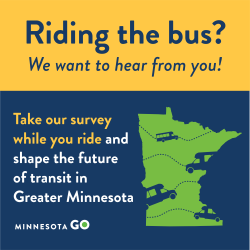Share What We Heard In Engagement Phase 2 on Facebook
Share What We Heard In Engagement Phase 2 on Linkedin
Email What We Heard In Engagement Phase 2 link
The second phase of engagement for the Greater Minnesota Transit Plan focused on gathering in-depth feedback on user experiences, where they can and cannot use transit, and collecting input on draft engagement goals. We worked with communities at 13 local events, hosted five community listening sessions and 3 1-on-1 interviews, held one meeting with our RIDE Advisory Task Force, and received over 800 survey responses. Below is a summary of what we heard:
Reliability – Unreliable transit makes it difficult for users to perform daily tasks such as shopping, medical appointments, and social interactions. Many people shared stories about the bus not showing up, being canceled, or arriving late, leaving them stranded and scared about how to get home. Others cited unreliability as a reason they do not use public transit even if they have a desire to.
Frequency and service times – For those with transit in their town, people across Minnesota shared that scheduling and frequency pose significant barriers. People said that the bus runs during typical work hours, with very limited or no service on the weekends or evenings. This lack of service makes it difficult to meet their personal needs or provide opportunities for social experiences.
Access to information – There is a desire for information about transit options to be shared more widely, especially with those who need it to prevent isolation, such as seniors and people with disabilities. There is also a need for information to be shared in other languages, as well as options to speak with staff in languages other than English, to improve user experience and increase access to transit.
Improved connection – People consistently shared that it is almost impossible to access neighboring cities or rural areas outside the city in which they live. People want to see more access to the Twin Cities, larger neighboring cities, and rural areas to increase access to employment, medical care, and airports.
Convenience – People who do not use transit frequently mentioned that it isn't convenient enough to use, and they would prefer to drive their personal vehicle.
Perception of transit – Negative perception of transit was often mentioned as a reason transit struggles to be prioritized in Minnesota. People would like to see more effort put towards changing people's perception to encourage more riders and improvements to the overall system.
Share Share your thoughts on the bus! on Facebook
Share Share your thoughts on the bus! on Linkedin
Email Share your thoughts on the bus! link

As part of our engagement efforts, we’re collecting feedback from riders to help shape the future of public transit in our state. Over the next two weeks, you’ll see MnDOT staff riding buses and talking with riders to hear about your experiences and priorities.
Survey Schedule:
Grand Forks / East Grand Forks – Tuesday, September 9
St. Cloud – Wednesday, September 10
Duluth – Monday, September 22
Our team will be conducting onboard surveys during regular service. Riders will be invited to share their thoughts through a short survey, and your feedback will directly guide planning and investments in Greater Minnesota transit.
Your voice matters! If you see our team on board, we’d love to hear from you.
Share What We Heard In Phase 1 on Facebook
Share What We Heard In Phase 1 on Linkedin
Email What We Heard In Phase 1 link
During the first phase, our team talked to residents in greater Minnesota to learn how they currently use transit and how it could better meet their needs. We attended six pop-up events throughout the state, held two meetings with the RIDE Advisory Task Force, hosted a community listening session with representatives from 15 organizations, and received feedback from more than 600 survey respondents. Below is a summary of what we heard:
-
Availability: The most common reason people cited for not using transit was the lack of options or limited availability. Existing riders also identified limited availability as their biggest challenge.
-
Convenience: Many people mentioned that transit is too inconvenient and time-consuming for them to use regularly. Current users also highlighted these challenges, noting how time-consuming and difficult it can be to reach their destinations when they rely on transit.
-
Personal vehicle preference and negative perception of transit: Many people prefer driving their own vehicle due to the flexibility it provides. Public transit is also often perceived as a service only for those who are not able to drive or have lower incomes. Some suggested that shifting this perception could increase usage and investment to public transit services.
-
Needs for an aging population: Older adults worry about how they will get around as they age and can no longer drive. People shared fears about isolation and the negative impact on personal well-being if they do not have a form of public transit to access errands, social opportunities, and other personal needs.
-
Access to healthcare: More public transit options are needed to better connect smaller communities and individuals who cannot drive to healthcare and appointments. While some services exist, issues with reliability and lengthy time commitments are challenging.
-
Connection to other cities: Many expressed an interest in expanded transit services, sharing that they would use public transportation more often if there were additional routes and service times to better connect them to other cities and the Metro area.
-
Reliance on volunteers: Individuals who are unable to drive or do not have access to a personal vehicle depend on volunteer driving programs for medical appointments and daily necessities. However, limited volunteers and rising costs make these programs increasingly difficult for both riders and organizers.
Share We're Hitting the Road This Week! on Facebook
Share We're Hitting the Road This Week! on Linkedin
Email We're Hitting the Road This Week! link
Join us at Wilmar Fest and Perham Turtle Fest
Help shape the future of transit in Greater Minnesota! The MnDOT Transit Planning Team will be out this week gathering feedback and ideas from the community. Stop by our booth, meet our team, and tell us what transit should look like in your community.
- Date: Thursday, June 19th
- Time: 2:00 p.m. – 7:00 p.m.
- Location: Robbins Island Regional Park, Willmar
- Look for: The MnDOT table!
- Date: Friday, June 20th
- Time: 12:00 p.m. – 6:00 p.m.
- Location: Downtown Perham (look for the MnDOT booth during the street fair)
- Look for: The engagement van and a chance for kids to color on it!
We’d love to hear from you—whether you use transit, want to use it, or just have ideas. Your voice will help guide policy and investment for transit systems across Greater Minnesota.






